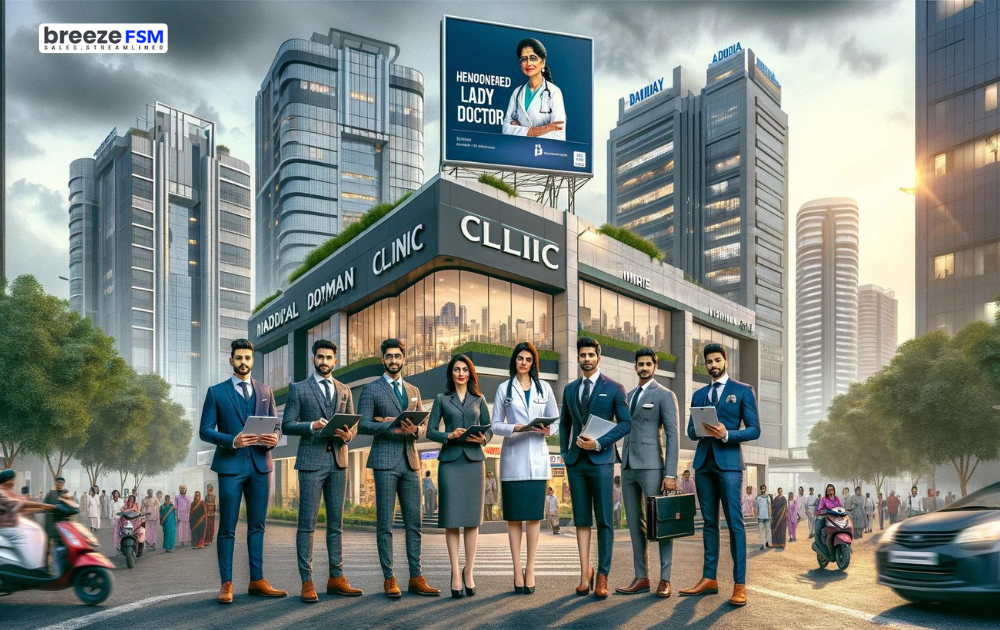- Payel Adhikary Ghosh
- Medical Sales, MR, pharma sales
- 0 Comments
- 1604 Views
In the world of Medical Sales where the ability to navigate through a maze of challenges determines your success, it’s essential to acknowledge that being a medical representative today involves more than just understanding your product; it’s about bringing a unified brand presence to the table, powering through lengthy sales cycles, coping with high price points, and thriving amidst intense competition.
We grapple with both external battles, like gaining access to physicians and navigating complex insurance parameters, and internal hurdles such as meeting sales goals and aligning with company culture.
In our introduction, we’ll shed light on these multifaceted challenges and showcase how resilience, persistence, exceptional communication skills, and adaptability are your best allies. Whether it’s physician apathy or the fast-paced evolutions in medical technology, our guide aims to arm you with strategies to overcome these obstacles. Staying ahead means being informed—comprehensive legislation depositories and ongoing training are pivotal tools that can amplify your role as a medical representative.
As we delve into the realms of product knowledge and audience engagement, remember, mastering your medical sales pitch is a continual learning process. Our article is not just about survival but thriving in the modern healthcare industry. So put on your learning cap and let’s enhance your approach to medical sales, ensuring you’re well-equipped for success in every interaction.
Understanding Your Product and Medical Sales Audience
In our pursuit to refine our medical sales techniques, we’ll explore how a deep understanding of both our product and audience forms the foundation of success. For instance, a platform like BreezeFSM, a field sales management tool, can revolutionize the way we, as medical representatives, interact with our clientele. Its robust features—lead management, customer engagement, and analytical reporting, all accessible via mobile CRM—streamline our workflow, allowing us to be more productive and responsive.
But to truly excel, we must adapt to the healthcare industry’s rapid evolution. magine leveraging telehealth and digital health solutions as we engage with healthcare professionals who, especially in India, often turn to online resources for information. Recognizing this trend allows us to create data-driven marketing strategies that capture attention in this digital era. What’s crucial here is building that creative toolkit for virtual meetings and personalized experiences that meet the unique challenges of our potential healthcare buyers.
We’re in an era where healthcare buyers are more informed than ever before. This demands us to not just present our products but to become product experts who can confidently answer the most specific queries. It’s time to craft buyer personas to get a laser-focused insight into our audience’s roles, challenges, and sources for information. This personalized approach doesn’t end there—engagement on platforms like LinkedIn, whether by sharing insightful content or by recognizing your lead’s special occasions, fosters genuine connections. By customizing our sales emails or following up with a content-rich webinar, we’re not just selling a product; we’re nurturing a relationship built on trust and expertise.
The shift in the medical landscape, especially the influence of the COVID-19 pandemic on medical practices’ purchasing decisions, means our sales pitch can’t stay static. Emphasizing patient benefits, staying abreast of industry trends, and leaning into the virtual realm arm us with a pitch that not just resonates but stays relevant.
Crafting and Delivering an Effective Pitch
Delving into the art of crafting and delivering an effective pitch, it’s crucial we harness our innate communication and persuasion skills, transforming every opportunity into a success story. As a seasoned medical representative, I’ve learned that personalization is the key. Tailoring our pitch to align with the physician’s goals, preferences, and pain points isn’t just a tactic; it’s a respect for their unique needs. With every product demonstration or discussion, we’re not just selling; we’re offering a solution that meshes seamlessly into the fabric of their professional lives.
Constructing the pitch starts with a robust understanding of our medical product. Knowing its features and advantages over competitors allows us to navigate questions and highlight benefits in a language that resonates with our audience. How does our product improve patient outcomes? How does it streamline surgical procedures? These are the narratives that pique interest, and here’s where I embrace the ‘Three Ps’: Personalization, Problem-solving, and Presence.
Whether it’s using flash drives or tablets loaded with engaging educational materials or getting our device into the surgeon’s hands before they request it, our approach has to be as cutting-edge as the medical field itself. Visual aids are also indispensable tools, as the majority of our clients are visual learners. A relevant chart or image can often convey what a thousand words cannot, staying etched in a client’s memory long after our meeting.
During my interactions, I’ve found that open-ended questions not only reveal significant insights about my clients’ needs but also demonstrate my willingness to listen, a trait that builds trust and rapport. With each meeting, the value of our products is reinforced through evidence-based medicine and clinical trial data, establishing a mutual understanding grounded in expertise and research. As medical representatives, we must don our hats as experts, not just on our catalog but also on our competitors’, adding credibility to our recommendations. And let’s not forget, every pitch culminates with a powerful open-ended question that invites the client into a dialogue, rather than a monologue, paving the way for a collaborative relationship.
In summary, as medical representatives, we must approach each pitch with a finely-tuned strategy – understanding our client, showcasing our product’s suitability through personalized, problem-solving discussions, and fortifying our presence in the healthcare community with every interaction. By following these guidelines, we are sure to see our medical sales strategies bloom in this modern industry.
Medical Sales Strategies Leads to Personalized Engagement
In conclusion, our exploration of effective medical sales strategies underscores the pivotal role of personalized engagement and expert product knowledge in the evolving healthcare landscape. We have discussed the importance of aligning our pitches to the unique needs of healthcare professionals, ensuring our interactions are not merely transactions, but collaborative dialogues that offer value and build trust. These key points reinforce our thesis that to thrive in medical sales, representatives must evolve from mere vendors to strategic partners in healthcare.
The strategies outlined in this article stand to significantly impact the success of medical sales professionals, echoing the broader implications for the healthcare industry at large. It remains imperative for medical representatives to continue refining their pitches and adapting to the digital advancements to remain at the forefront of this dynamic field. As the industry continues to transform, let this guide serve as a foundation upon which further research, innovation, and practice can build a future of stronger, more effective medical salesmanship.
FAQs
Navigating through a medical sales career can spark an array of questions, from preparing pitches to handling interviews and improving engagements. Let’s tackle some of these frequently asked questions that you might have as we journey through this career landscape together.
Key Steps in Preparing a Medical Sales Pitch: Preparation is paramount, and it all starts with:
- Grasping the intricate needs and preferences of your potential clients, whether they’re doctors, administrators, or insurers.
- Diving deep into every detail of your product; knowing it inside and out—including how it stands out in the competitive market.
- Anticipating the curveballs by readying yourself for any questions or concerns that might come your way.
Common Interview Questions for Medical Device Sales Representatives: If you’re aiming to become a standout medical sales representative, you should be ready to discuss:
- How you’ve navigated the complexities of medical device sales and what strategies led to your greatest successes.
- Ways you stay updated with medical advancements and how this knowledge has influenced your sales approach.
- Your techniques in building and nurturing professional relationships within the healthcare sphere, and overcoming inevitable objections that arise during sales discussions.
In our careers, we continually seek growth and refinement. To enhance your medical sales pitch, consider:
- Stepping into your clients’ world with comprehensive pre-pitch research.
- Finding the right balance in your delivery—confidence should be your trademark, and an appealing tone is your vehicle to convey authority.
- Smart infusion of statistical backing to substantiate your claims, supported by vivid visual aids that make your message stand out.
As for bringing in fresh talent to your medical sales team, you’d want to look out for candidates who bring more than just a polished resume. Seek individuals with:
- Dynamic communication styles, who can articulate complex product information with ease.
- Agile thinking, showcasing an ability to pivot swiftly in response to changing circumstances.
- A track record that reflects their mastery over the nuances of the medical sales domain, especially through the lens of behavioral interview responses.
In a nutshell, the journey to mastering medical sales is marked by continuous learning and adaptation. Remember, as medical representatives, our quest to enhance our pitch is coupled with an ongoing mission to elevate ourselves as strategic partners in the healthcare narrative. The roadmap is vivid—let’s traverse it with the know-how, agility, and acumen that define the exceptional medical representative.





